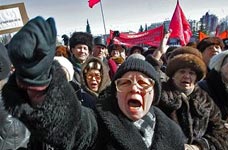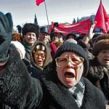
OPPOSITION IN BASHKORTOSTAN AND INGUSHETIA VOW TO NOT RETREAT
Publication: Eurasia Daily Monitor Volume: 2 Issue: 68
By:

At 1:21 pm local time (3:21 am in Washington DC), a charter plane loaded with citizens opposed to the rule of Bashkortostan President Murtaza Rakhimov left Ufa airport for Moscow.
Two days ago (April 5), Bashkir opposition leaders announced that 150 of its members were planning an April 7 rally on Lubyanka Square, in the heart of Moscow. Ramil Bignov, a Bashkir tycoon and a leader of the opposition, paid for a chartered Boeing jet and all 215 tickets were reserved in advance. The rally seeks to force federal authorities to “radically interfere in the current situation in Bashkortostan.” The opposition has also prepared a petition with 167,000 signatures demanding Rakhimov’s immediate resignation (gazeta.ru, April 5). Protestors plan to present the petition to representatives from the Russian presidential administration.
Clearly, the leaders of the Bashkir opposition want to propose their own presidential candidates to Russian President Vladimir Putin, who would appoint Rakhimov’s replacement if the Bashkir leader resigns. “It is an exclusive right of Vladimir Putin to decide who will change Rakhimov, but behind-the-scene games cannot be avoided. We will propose our candidates, but not in public,” Bignov told gazeta.ru. At the same time he refused to answer whether he himself would be a candidate.
Marat Khaiyirulin, another opposition leader, said that if a Ukraine-type Orange Revolution were to take place in Russia, it would start in Bashkortostan. He also implied that during the March 27 rally in Ufa, the Bashkir capital, the opposition “could have easily taken the Government Palace,” but Bignov managed to stop the crowd (gazeta.ru, April 5).
Rakhimov pulled out all stops to prevent the opposition delegation from going to Moscow, even ordering air traffic officials to not allow the opposition plane to take off from Ufa airport. Bignov declared that if they were not allowed to fly, they would go to Moscow by train or by buses (gazeta.ru, April 5).
Takeoff from Ufa was delayed five hours when one of the passengers, bearing a name not on the passenger manifest, suddenly announced that he needed off the plane because of urgent family business. The aircraft was then transported to an emergency airstrip for a search.
Gennady Shabayev, a deputy from Bashkorostan’s State Council, said that the opposition regarded this incident as a provocation, aimed at obstructing the planned protest in Moscow. Shabayev said the flight was delayed twice; first when the security service spent an hour doing passenger checks, and second, when a passenger suddenly deplaned.
While the standoff between the opposition and Rakhimov continues, the Kremlin remains silent. The Kremlin has made no comment on the Bashkir issue, although the Moscow city government easily granted permission for the opposition to hold a rally on Lubyanka Square, in front of the Federal Security Service (FSB) building. The rally’s main slogan will be “Baskhiria is a political Gulag,” meaning that Rakhimov is a tyrant.
While the Bashkir opposition marches on Moscow, their counterparts in Ingushetia have indicated that they are not going to surrender either. Despite the fact that a previous rally against local President Murat Zyazikov was banned — and a column of armored personnel carriers moved into Ingushetia to intimidate the population — leaders of the opposition Ahki-Urt movement have announced that they are preparing for a much broader campaign. Next they are planning to hold four simultaneous rallies.
Like their Bashkir comrades, they are calling on the Ingush people to go out to the streets, not only in Ingushetia, but in other Russian cities as well. According to their statements, members of the Ingush diaspora in Moscow and Rostov-on-Don are ready to join the anti-Zyazikov protests. At the same time, rallies are going to take place in Magas, the Ingush capital, and in the town of Nazran. “This is the only way for the locals to condemn the lawlessness that is happening in the republic,” opposition leader Musa Ozdoyev told Ekho Moskvy radio. “Zyazikov is not ready to initiate a dialogue with Ingush society, he has no capability to make any decisions or take responsibility…Ingushetia does not need leaders involved in corruption” (Ekho Moskvy, April 4).
Zyazikov is trying to defend himself by pretending there is no political crisis in the republic. He has accused “extremists” and some mass media of “exaggerating the situation.” On April 1, during a meeting with Putin, Zyazikov characterized the situation in Ingushetia as “stable.” He said, “The fate of people should not be decided on the streets.” The Russian president called upon Zyazikov “to make a barrier against any kind of extremism, but quickly respond to the needs of people” (NTV, April 1).
As with the standoff in Bashkortostan, Putin has not criticized the Ingush opposition directly. Putin’s order for Zyazikov to respond to the needs of the Ingush people immediately bolstered the opposition’s courage. In an interview with Regnum news agency, Ozdoyev said that this phrase was Putin’s response to Zyazikov’s complaints about opposition “extremism.” Ozdoyev said that he was sure that Zyazikov would not be re-appointed as president of Ingushetia (regnum, April 5).
Nevertheless, it is hard to imagine that the Russian president will easily sacrifice Rakhimov and Zyazikov, two men who are absolutely loyal to him. It is even more difficult to imagine that Putin will agree to discuss candidates for the presidency of either republic with the opposition. Certainly, the new Russian law stipulating that the Kremlin must appoint heads of regional executive branches was not designed to encourage discussion of possible candidates with street leaders. Rather, this law is intended to make the Kremlin the only source of power in the Russian Federation.
However, the unfolding regional political conflicts may force the federal authorities to look for a compromise with citizens who are unsatisfied with their local leaders.




